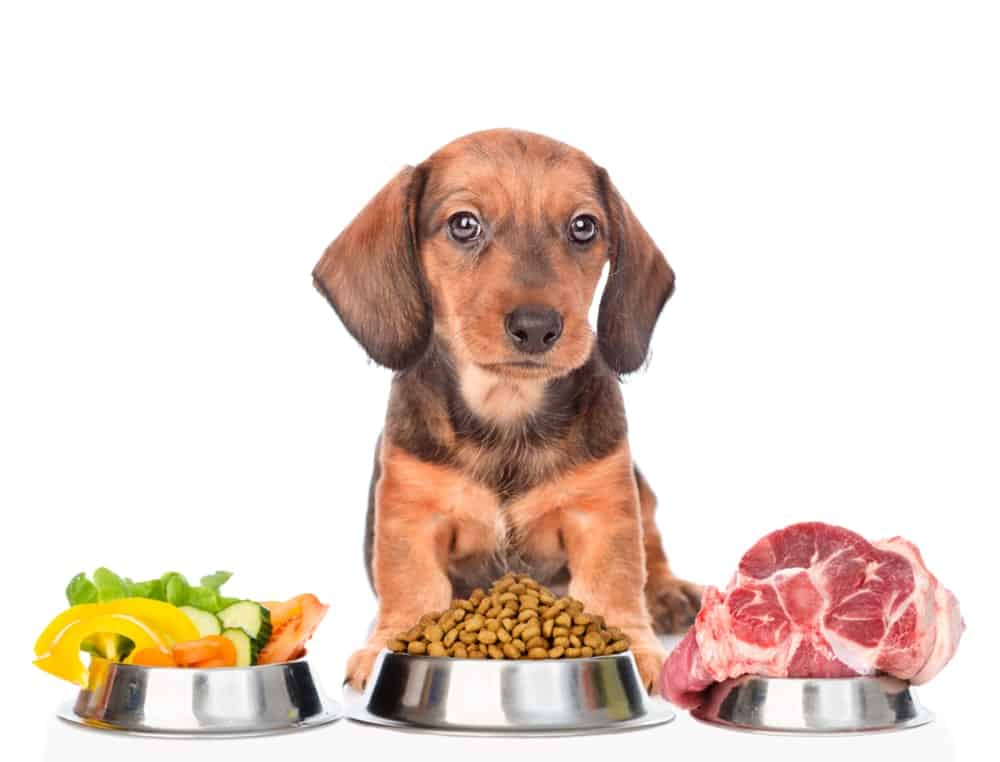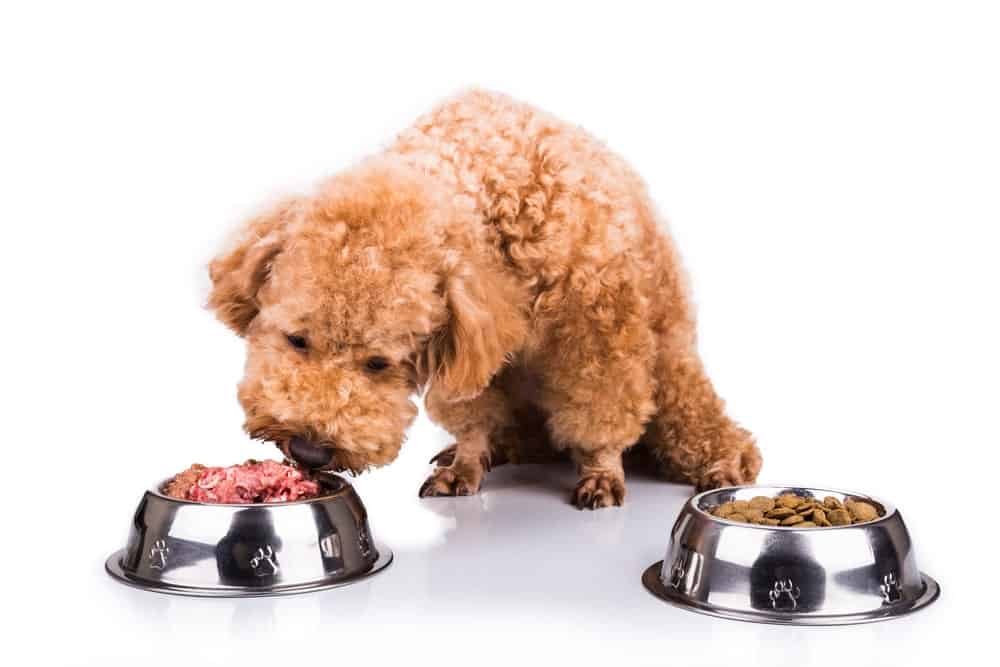“This post contains affiliate links, and I will be compensated if you make a purchase after clicking on my links.”
By Dr. Judy Morgan, holistic veterinarian and author of “Yin & Yang Nutrition for Dogs”
Most pet owners are aware of the list of foods that are toxic to dogs, including chocolate, alcohol, onions, grapes, raisins, Macadamia nuts, yeast dough, and products containing xylitol (found commonly in peanut butter products most recently). However, they may not be aware of food additions that can help optimize health and vitality.

Vitamins in pet foods that have undergone heat processing degrade during heating. To combat this degradation and to avoid deficiencies of vitamins and minerals, synthetic vitamin and mineral mixes are included in the formulation to ensure our pets are getting complete and balanced nutrition. The same problems occur in the human food industry, which is why products that undergo pasteurization (think dairy and refrigerated fruit juices) have added vitamins and minerals such as Vitamin D and calcium.
A common mistake made by pet food consumers occurs when the bag of dry kibble is emptied into a bin for storage in the home. The pet food bags have a waxy liner that prevents exposure to air and subsequent oxidation. Light and air cause the fats in the pet food to oxidize, leading to rancidity and degradation of fat-soluble vitamins (A, D, E, and K). Dry pet food should be stored in the original bag, sealed tightly after each use, in a cool dark place.
Pet owners can also supplement their pet’s diet with fresh, whole foods packed with wholesome nutrients, vitamins, and minerals. Some of my favorite additions include:
- Eggs — This superfood is packed with healthy protein, fats, and vitamins. The egg yolk provides a healthy source of fat-soluble vitamins A, D, E, and K. Unlike people, pets are not capable of converting sunlight into Vitamin D, requiring dietary sources of this vitamin. Vitamin D deficiency may play a role in heart failure; testing for Vitamin D levels can be performed by your veterinarian through a blood sample. The egg white provides high quality protein, along with some B vitamins and potassium. I like to keep hard boiled eggs on hand to use as a treat. Instead of throwing away egg shells, they can be dried and ground, adding them to meals to provide an extra calcium source. This is especially beneficial for pets on a home-prepared diet which requires the addition of calcium. Generally one-half to one egg per day is recommended.

- Sardines — Canned sardines in water or oil can be added to any meal. Sardines provide omega 3 fatty acids and CoenzymeQ10 that contribute to heart, brain, joint, kidney, and skin health. They help support a healthy immune system and may improve cognitive function in senior dogs. Small fish such as sardines have lower mercury content than large fish, decreasing chances of heavy metal toxicity. Sardine bones are soft and easily digestible, providing an added source of calcium for strong bones and teeth. Supplementing with one or two small fish a few times a week can make a big difference in coat quality for dogs with dry skin and coat.
- Cranberries —These small berries contain powerful antioxidants, including Vitamin C, which helps decrease inflammation throughout the body. Cranberries have the added benefit of an ingredient called A-type proanthocyanidins (PACs), which interfere with the ability of bacteria to stick to the bladder wall. This ingredient makes cranberries especially helpful for pets prone to recurrent urinary tract infections. For better digestibility, cranberries should be crushed or cooked. One to four tablespoons per day, depending on the size of the dog, will provide the desired benefits.
- Medicinal Mushrooms — These include different varieties, such as Reishi, Maitake, or Shiitake mushrooms. While many websites say that mushrooms are toxic for animals, they are really referring to poisonous mushrooms. Medicinal mushrooms, on the other hand, provide incredible health benefits. (This does not include white button mushrooms, which do not provide the same elements.) Mushrooms provide anti-viral, anti-bacterial, and immune-boosting properties to the body, which may help prevent cancer. An added benefit is stabilization of blood sugar in diabetic pets. The active ingredients in mushrooms are most effective when the mushrooms are gently cooked. Mushroom extract capsules and powders are also widely available.
- Pumpkin — It can be added as fresh or canned pumpkin (not pumpkin pie mix). Pumpkin provides a great source of Beta-carotene, which converts to Vitamin A, necessary for eye health and immune system function. Pumpkin provides a great source of soluble and insoluble fibers which are important for growth of the healthy bacteria in the large intestine. Healthy gut flora, also known as the microbiome, contributes to immune system function. One to four teaspoons of pumpkin per day is plenty to achieve the health benefits it offers. If using fresh pumpkin, it will need to be chopped and cooked to increase digestibility.
- Cruciferous Vegetables — Broccoli, Brussels sprouts, cauliflower, kale, and cabbage are packed with antioxidants and vitamins that help decrease inflammation. These vegetables are known to be cancer-fighters by repairing DNA in cells. Additions of fibrous vegetables may help with weight loss, as well. Vegetables need to be processed in a food processor or cooked to break down the plant cell walls and enhance absorption and usefulness in the body. Anywhere from one teaspoon to one quarter cup of pureed or cooked vegetables can be added to the daily diet. Excessive feeding may lead to gas production in the large bowel.
Home-prepared raw or cooked diets are becoming more popular with pet owners, but many do not have the required time or knowledge to consistently provide balanced meals. For those wanting to improve health without requiring excessive preparation, the food additions listed above will improve their dog’s health and vitality.
ABOUT DR. JUDY MORGAN:

Dr. Judy Morgan, the 2018 Woman of the Year in the Women in the Pet Industry Network, is a certified and accredited veterinary acupuncturist, chiropractitioner, and food therapist. Based in southern New Jersey, she currently operates two award-winning veterinary hospitals. She is a sought-after speaker at dog shows, pet expos, and veterinary conferences, as well as a best-selling author of four books on holistic pet care and feeding including the recently released title Yin & Yang: Nutrition for Dogs, a holistic cookbook for pets that encourages the healing power of whole foods. Her weekly Naturally Healthy Pets radio show can be heard on DreamVisions7Radio. She can be reached at www.drjudymorgan.com.



















sugarpawz
Mar 4, 2019 at 8:43 am
Very important. After that I will pay attention when I feed my dog
charlene joyce
Jan 30, 2019 at 12:39 pm
that is all good to know what about Tastes of the Wild